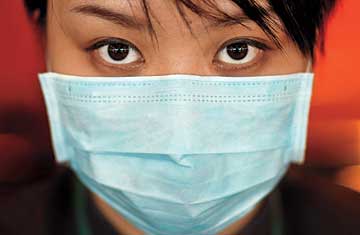
Where H1N1 spread, masks followed in an effort to stem the new flu virus.
(4 of 4)
Washington can and should continue to augment the country's antiviral stockpile and publish revised pandemic plans like the 396-page doorstopper put out by the Department of Health and Human Services in 2005. Increasing our capacity to manufacture and distribute flu vaccines within our borders is also a must. But truly preparing the country for a pandemic means tackling the basic flaws at the heart of the health-care system--starting with the some 50 million Americans who lack any health insurance. They're more likely to flood hospitals for care during a pandemic, further taxing what will be an overburdened system. "They're akin to the Typhoid Marys of the last century," says Columbia's Redlener. "They'll be spreading this disease in ways that are completely unpredictable."
The danger posed by the uninsured is another reminder that when it comes to infectious disease, we're all in this together. Sick pigs and sick people, a virus in Mexico and an infection in New Zealand--in a globalized world, microbial threats that seem far away can be on our doorstep in hours. "As a global community, we are only as strong as our weakest link," says the CDC's Besser. If we want to prevent the next pandemic--or at least survive it--we need to remember that.
